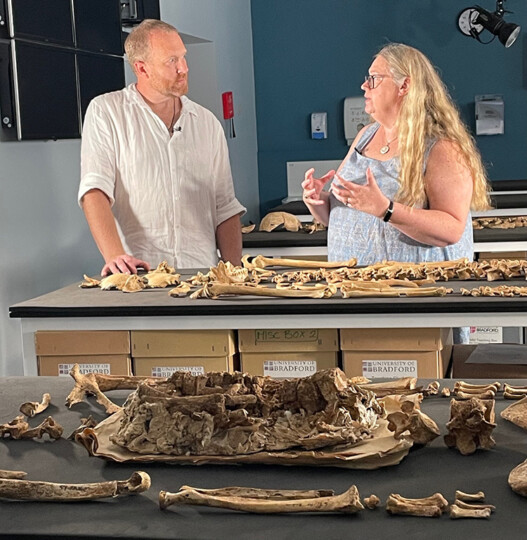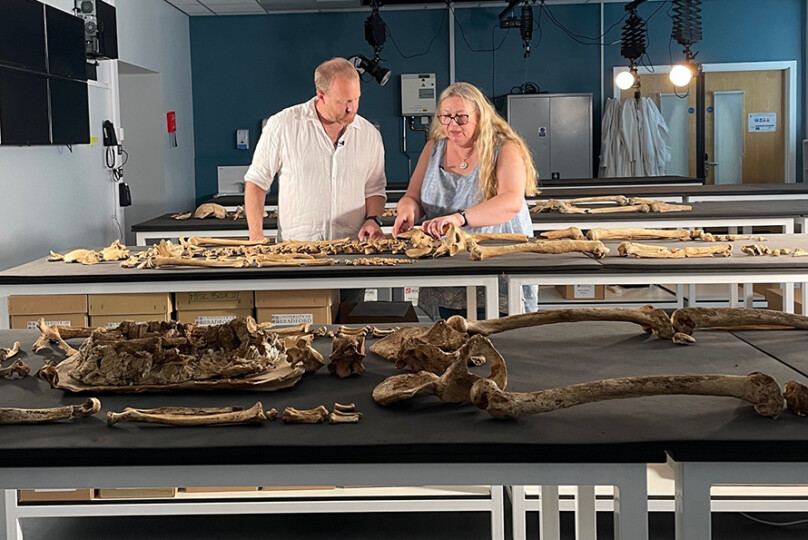Skeleton secrets uncovered in new medieval documentary
An online film featuring skeletons from early medieval England examined by an expert from the University of Bradford has been released.
History Hit’s film, ‘Medieval Cold Case: Death in the Dark Ages’, features Dr Jo Buckberry, from the University’s Department of Archaeological and Forensic Sciences, providing her expertise on three skeletons dating back to the early medieval period, classed as the fifth to the 11th centuries, on the film.
The one hour-long documentary, released on YouTube, takes a closer look at skeletons of an early medieval man killed in battle, a male with leprosy, and a third man possibly executed as a criminal.
Dr Buckberry is joined on the programme by Matt Lewis, History Hit’s Senior Presenter, in the University’s Keith Manchester Laboratory.
She said: “It was delightful to welcome History Hit back to Archaeological and Forensic Sciences at the University of Bradford and to discuss more individuals from our extensive skeletal collection with Matt.
“This time we focused on three individuals from the early medieval, or Anglo-Saxon, period. One died from multiple sword injuries, another had an unusual strain of leprosy and a third who was decapitated, probably as punishment for a crime.”

Matt Lewis, History Hit Senior Presenter, and Dr Jo Buckberry, from the University of Bradford’s School of Archaeological and Forensic Sciences, take a closer look at the skeletons for the YouTube documentary film. Images credit: University of Bradford/History Hit
What the film features
The first skeleton, a male in his 20s at the time of death, dated back to sometime between the seventh and 10th century, and was previously buried in a cemetery in Eccles, Kent, until excavation in 1976.
He had suffered 30 injuries to his body during battle, including to the pelvis, jaw, ribs, neck and head.
The second skeleton was a male in his 20s with leprosy, a condition confirmed by his upper jaw and hand bones. He was previously buried in a churchyard in Northamptonshire. Dr Buckberry revealed the man’s infection had got into the skeleton’s leg.
The third skeleton was of a male aged between 21 and 32, dating back between the seventh and 11th century. He was decapitated and understood to have been executed as a criminal.

Matt Lewis, History Hit Senior Presenter, and Dr Jo Buckberry, from the University of Bradford’s School of Archaeological and Forensic Sciences, take a closer look at the skeletons for the YouTube documentary film. Images credit: University of Bradford/History Hit
What is History Hit?
History Hit produces online documentaries and podcasts, lifting the lid on historical eras including the Iron Age, Tudor period and the Second World War. Its YouTube channel has 1.78 million subscribers.
This is History Hit’s latest video filmed at the University of Bradford, which previously included the first episode of Medieval Cold Case: The Stirling Castle Skeletons documentary series, which has received 415,000 views, and features in this latest video in a viewers’ questions and answers section.
Matt Lewis said: “It was fascinating to be back at the University of Bradford to visit Dr Buckberry and investigate the stories of some of the human remains studied there.
“The University is always open and welcoming in sharing the history within its walls, while ensuring we never forget that we are in the presence of people from the past who deserve respect.
“I hope the documentary will be as well-received as the last one was, not least so that I can return to Bradford to continue to explore these fascinating stories from the past.”
This project reflects the University of Bradford’s strategy by showcasing its world-class research, expertise and teaching in Archaeological and Forensic Sciences. By partnering with History Hit, the University is sharing knowledge in innovative ways that reach global audiences, supporting its goal to grow research reputation and inspire lifelong learning. It also demonstrates the University’s commitment to making a positive impact on society by deepening understanding of human history and culture.

